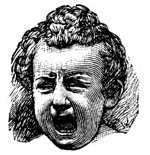
Bumping Off Baby
ARE WE ROMANIZING?
During the days when the Romans ruled the known world, the survival of a newborn child was Dad’s decision. The midwife would lay the newborn baby on the ground; if the paterfamilias picked him up, everyone breathed a sigh of relief — the father had “taken” the child, recognizing the newborn as his own. If he declined to raise up the newborn, the child was removed and exposed outside the house or in a public place. He could be claimed by anyone who wanted him — if not, he died.
The rich might expose a child so as not to invalidate a pre-existing will or have to divvy up their estate between numerous children. The middle class preferred to concentrate their attention and resources on a smaller number of children so as to be able to increase their chances for advancement in the world. And the poor were simply unable to feed their offspring.
Ironically, though, while the rich were happy to be rid of an unwanted child, the poor hoped for a better life for theirs, and sometimes an exposure would be faked, the mother secretly giving the newborn to neighbors or another family to raise and keep as a slave, perhaps in the future setting him free. Rarely, such a child might be incredibly fortunate and achieve high status — such as the girl who grew up to become the wife of Emperor Vespasian.
But the sad reality was that few exposed children survived.
Malformed infants were exposed or drowned: “What is good must be set apart from what is good for nothing,” were the Stoic philosopher Seneca’s words. Illegitimate children of wayward daughters were unwanted. A man who suspected his wife of adultery would expose the child she bore. A child might be exposed to make a political or religious statement. And the children of slaves could be killed.
And it was all perfectly legal and accepted.
You May Also Enjoy
Catholics or non-Catholics who practice contraception but oppose premarital or extramarital sex hold a position that is logically inconsistent.
The prophet gives words that echo an understanding of the heart. He understands the tragic situation and speaks of comfort, solace, hope, and then begins to help.
In the face of rising opposition, will the Church blossom, as John Paul predicted, or will she contract, as Benedict expects?

